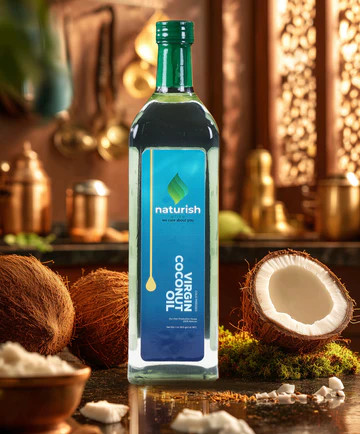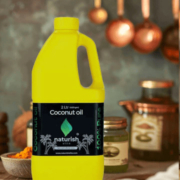Pure vs Virgin Coconut Oil: Decoding Labels for Smarter Choices
If you’ve ever stood in a supermarket aisle staring at rows of coconut oil bottles, you’re not alone. Words like pure, virgin, cold-pressed, and refined can be confusing, and many of us end up buying whatever looks most appealing without really knowing the difference. But if coconut oil is something you use for cooking oil, skincare, or even wellness, it’s worth taking a closer look. This article unpacks the difference between pure and virgin coconut oil, clears up common marketing myths, and helps you make smarter choices when shopping.

What is Pure Coconut Oil?
The term pure coconut oil often sounds reassuring, but in most cases it refers to refined coconut oil. This oil is extracted from dried coconut meat, known as copra. Because copra is prone to impurities, the oil usually goes through refining, bleaching, and deodorising—commonly called the RBD process.
- How it’s extracted: From dried copra using heat and sometimes chemicals.
- Nutritional value: Still contains medium-chain fatty acids but loses some antioxidants and delicate nutrients in the refining process.
- Best uses: Popular for frying, baking, and processed foods because of its high smoke point and neutral flavour.
In other words, pure coconut oil is stable for high-heat cooking but is not as nutrient-rich as less processed versions.
What is Virgin Coconut Oil?
Virgin Coconut Oil is often considered the premium variety. Unlike pure coconut oil, it’s produced from fresh coconut flesh rather than dried copra. Extraction methods include cold-pressing or fermentation, both of which avoid chemical treatment.for using daily cooking oil .
- How it’s extracted: Cold-pressed from fresh coconut meat or milk.
- Nutritional value: Packed with lauric acid, antioxidants, vitamin E, and beneficial plant compounds.
- Best uses: Excellent for everyday cooking at medium heat, salad dressings, smoothies, and beauty applications such as skincare and haircare.
Because it retains more natural goodness, Virgin Coconut Oil carries a stronger coconut aroma and taste, along with a higher price tag.
The Key Difference Between Pure and Virgin Coconut Oil
To make a smart purchase, it’s useful to compare them side by side:
- Source material
- Pure: Extracted from dried copra.
- Virgin: Extracted from fresh coconut meat.
- Pure: Extracted from dried copra.
- Processing method
- Pure: Refined, often with heat or chemicals.
- Virgin: Naturally extracted, no chemicals used.
- Pure: Refined, often with heat or chemicals.
- Taste and aroma
- Pure: Neutral and odourless.
- Virgin: Rich coconut flavour and aroma.
- Pure: Neutral and odourless.
- Nutritional profile
- Pure: Retains fatty acids but loses some antioxidants.
- Virgin: Higher in antioxidants and bioactive compounds.
- Pure: Retains fatty acids but loses some antioxidants.
- Price point
- Pure: More affordable.
- Virgin: Premium, reflecting the quality and effort involved.
- Pure: More affordable.
Marketing Myths and Misleading Labels
The coconut oil industry can be tricky to navigate because of clever labelling. Here are a few common myths:
- “100% Pure” doesn’t always mean unrefined: This term often refers to refined oil. Always check whether the oil is refined or virgin.
- Cold-pressed confusion: If you see “cold-pressed pure coconut oil”, be cautious. Cold pressing is usually associated with virgin oil. The term can sometimes be misused.
- All-purpose claims: Some bottles boast “perfect for cooking and beauty”. While technically true, remember that refined oil is better suited for frying, while Virgin Coconut Oil offers more nutrition for both health and beauty.
How to Choose the Best Coconut Oil for Cooking
Choosing the right coconut oil boils down to your needs. Here are some practical tips:
- Read the labels carefully: Look for specific words like virgin, extra virgin, or cold-pressed. Avoid vague claims such as “100% pure” without further details.
- Check the extraction method: For maximum nutrition, pick oils that are cold-pressed or wood-pressed.
- Consider your purpose:
- For deep frying: Pure coconut oil is heat-stable and cost-effective.
- For everyday meals and healthy cooking: Virgin Coconut Oil provides more nutrients and flavour.
- For deep frying: Pure coconut oil is heat-stable and cost-effective.
- Mind the packaging: Dark glass bottles protect oil better than clear plastic, keeping it fresh for longer.
Why This Knowledge Matters
Understanding what’s really inside the bottle helps you avoid overpaying for misleading labels. It also ensures you choose a cooking oil that suits your lifestyle. If you want a neutral, budget-friendly option for frying, pure coconut oil works fine. But if you’re after added nutrients and flavour, Virgin Coconut Oil is worth the investment.
Conclusion
At first glance, the labels on coconut oil bottles can be confusing, but once you know the difference between pure and virgin coconut oil, it becomes much simpler. Pure cooking oil, often refined, is practical for high-heat cooking, while Virgin Coconut Oil retains more nutrition and delivers a natural coconut flavour. By learning how to read labels and spot misleading claims, you can confidently pick the best option for your cooking and wellness needs.
FAQs
1. Is pure coconut oil unhealthy compared to virgin?
Not at all. Pure coconut oil is safe and heat-stable, but it does lose some nutrients during processing. Virgin oil simply offers more antioxidants and flavour.
2. Can Virgin Coconut Oil be used for frying?
It can, but it’s best for sautéing, baking, and medium-heat cooking. For deep frying, pure coconut oil is more economical and stable.
3. Why is Virgin Coconut Oil more expensive?
Because it’s extracted from fresh coconuts without chemicals, the yield is lower and the process more labour-intensive, which raises the price.
4. How can I tell if coconut oil is genuinely virgin?
Look for clear labelling like cold-pressed and unrefined. Authentic Virgin Coconut Oil should also have a gentle coconut aroma.

